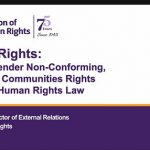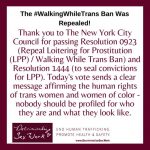November 24, 2020
The conflation of consensual adult sex work and human trafficking remains a harmful paradigm that continues to be promoted by a number of organizations and individuals, especially those who seek to prohibit prostitution. Human trafficking is a horrible human rights violation and exists in many labor sectors. Trafficking in agriculture and the hospitality industry is much more common than trafficking for the purposes of sexual exploitation, yet much of the world’s concern is focused on “sex trafficking.” Treating adults who freely engage in sex work as victims and over-relying on criminal justice to end trafficking have led to disastrous outcomes for sex workers.
The Protocol to Prevent, Suppress and Punish Trafficking in Persons, Especially Women and Children was one of three Palermo protocols adopted by the United Nations to supplement the 2000 Convention against Transnational Organized Crime (the Palermo Convention). Sex workers have been targeted under this protocol from its inception. With 20 years of data to consider, it is clear that the criminalization of sex work causes immeasurable harm and makes it more difficult to identify and assist actual victims of trafficking.
In “Missed opportunities and exclusion: sex workers reflect on two decades of anti-trafficking,” the International Committee on the Rights of Sex Workers in Europe (ICRSE) writes: “Sex workers and their organisations continue to challenge punitive anti-trafficking policy frameworks that target their workplaces and clients, rather than traffickers. Over the last twenty years, sex workers have not only had to combat the criminalisation of sex work, but have also endured global crises such as the 2008 financial crisis and the ongoing COVID-19 pandemic. They have also been faced with the erosion of human rights, shrinking civil society spaces, and volatile political environments.”
“Prostitution prohibitionists claim that trafficking increases in times of public crisis, but the reality is that poverty, precarity, and the need to cross borders to obtain a better life are the key factors leading people to sell sex,” the ICRSE says. “The post-COVID recession will be a crucial time to determine which approach is best suited to protect those most at risk in our society. Do we want a punitive approach that denies the root factors making people vulnerable to exploitation and trafficking? Or a community-led approach, where sex workers engage with policymakers and other marginalised communities to shape the decisions that will affect their lives?”

Artwork by Carys Boughton. All rights reserved. (Photo: Open Democracy)
DSW Newsletter #21 (December 2020)
Hero of the Month: Mataoe Aiden James Nevils

The Palermo Protocol: 20 Years Later

Transgender Day of Remembrance Summit

G.L.I.T.S. Opens First Housing Complex of its Kind

NYC Council Repeals ‘Walking While Trans’ Ban

Mark Your Calendars for December 17

 Hero of the Month: Mataoe Aiden...
Hero of the Month: Mataoe Aiden...
 The Palermo Protocol: 20 Years Later
The Palermo Protocol: 20 Years Later
 Transgender Day of Remembrance Summit
Transgender Day of Remembrance Summit
 G.L.I.T.S. Opens First Housing Complex of...
G.L.I.T.S. Opens First Housing Complex of...
 NYC Council Repeals ‘Walking While Trans’...
NYC Council Repeals ‘Walking While Trans’...
 Mark Your Calendars for December 17
Mark Your Calendars for December 17
